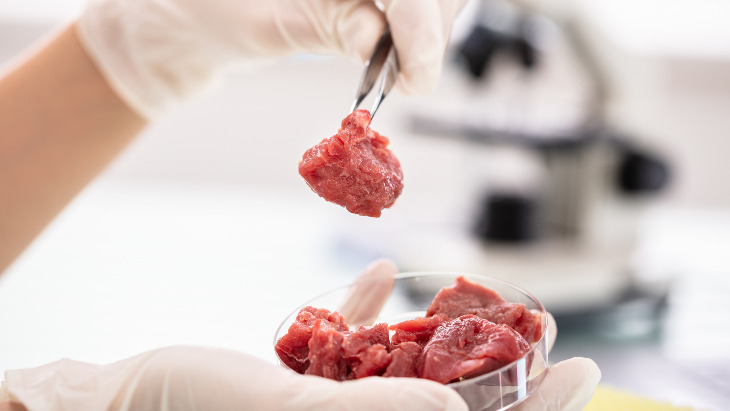Eating food used to be a simple thing.
In the past, people’s diets were more or less dictated by where they lived in the world; what could be grown or raised in your specific locale is what you ate.
On the other hand, in our day and age of industrialization and globalization, we eat foods that come from all over the world. Location no longer determines our diets and our pantries are stocked with foods that come from countries near and far. The distance between farm and table has grown enormously.
But it’s the involvement of science and technology in the food industry that is the real game-changer in our day. Food tech has introduced foods and ingredients to our diets that were simply unknown in the past as well as methods of growing and production that would seem like science fiction to our recent ancestors.
One of the strongest examples of this happening right now is lab-grown meat.
Main questions usually center around the impact of our food choices on human health, on the welfare of animals as well as on environmental health.
For the past number of years, companies around the world, including and especially in Israel, have been raising serious sums of money to fund the research and development behind producing meat in labs using stem cells from animals. The truth is they’ve already succeeded at doing so; the main tasks they’re working on now is making it taste really good as well as cost-effective for the average consumer. (Currently it costs over $15,000 per pound.)
While there are still many technical complications and challenges with realizing this goal, many people believe, and hope, that lab-grown meat will be the way of the future. If this science-fiction reality really happens (which it very well may) it means cutting out most, if not all, of the need for animal agriculture since only a small number of animals will be needed to provide the stem cells necessary.
This has huge beneficial implications for the environment. An end to animal agriculture means an end to the enormous amount of resources it requires (water, feed, land), an end to the massive amount of pollution it contributes to our world and an end to the daily suffering of billions of animals who are raised in cramped and crowded conditions on factory farms.
Sounds like a dream, right?
But like anything, the reality and ramifications of lab-grown meat are not yet 100% clear. There are important questions to consider about producing meat from bio-reactors inside labs instead of from living animals.
Is it Kosher?
First of all, from a Jewish perspective regarding kashrut, the question must be asked, and is, if meat grown in a lab is actually considered meat. The consequences of the answer to this question are many. Among them: Will lab meat made from non-kosher animals be considered kosher to eat? Can lab meat be eaten together with dairy?
As you can imagine, different rabbis have come out with different opinions on this, while others are still contemplating the question. If lab meat does indeed become a reality we can expect to see very clear answers to these never-before-asked questions.
Is it Vegan?
Another big question being asked is: will vegetarians eat lab meat? It doesn’t come from a slaughtered animal, so it seems like it should be a clear yes, right.? But, like the rabbis, vegetarians (and vegans) are weighing in on different sides of this issue. For some, the fact that no animals were raised or killed makes it okay by them. For others, simply taking stem cells from an animal is enough to make it off limits.
There are other ethical questions to this issue as well. While there are clear benefits to greatly reducing, if not entirely eradicating, animal agriculture from our world, there is the question of not fully understanding the ramifications of creating something that has never existed in our world before.
Will eating lab meat come with any hidden side effects? May it cause unforeseen long-term health issues?
There is also the question of who will control the production of lab meat. As it stands now, a large proportion of the financial support of this new industry comes from mega corporations who already own a large share of America’s food production and food industry. Is that something people are comfortable with?
And then there is the theological question of just how much science and technology should be applied to our food.
Is it “playing God” to create meat that didn’t come from a living animal, one that was born naturally and eventually slaughtered? Or did God give us these new abilities in order to improve the way we eat and provide a better means to providing more food for a growing human population?
As this technology is still being developed and improved upon, clear conclusions haven’t been reached regarding these intriguing and important questions, but one thing is for sure:
Eating food today is only becoming a more and more complicated endeavor.

















